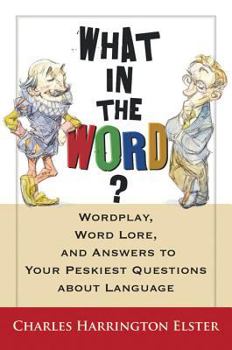What in the Word?: Wordplay, Word Lore, and Answers to Your Peskiest Questions about Language
Select Format
Select Condition 
Book Overview
Are you so sure about "assure," "ensure," and "insure"? Can you determine whether a knob of butter is equivalent to a lump or a pat or a scosh? Can you say which word in the English language has the most definitions, or who put the H in Jesus H. Christ? If you can't, be assured that Charles Harrington Elster, author of several well-loved works on language, can--and does in his latest book, a delightfully designed compendium of the most common,...
Format:Paperback
Language:English
ISBN:0156031973
ISBN13:9780156031974
Release Date:November 2005
Publisher:Houghton Mifflin
Length:304 Pages
Weight:0.70 lbs.
Dimensions:0.7" x 5.3" x 8.0"
Customer Reviews
5 ratings
A quirky book that's lots of fun
Published by Thriftbooks.com User , 16 years ago
Great little book for those curious about the strange and odd twists and turns the English language takes when used in everyday life. Mr. Elster reveals the origin of many of the phrases used in modern conversation and relentlessly criticizes those people in our society who, in an egotistical attempt to coin a phrase, butcher the English language. Fun book.
Reading for fun.
Published by Thriftbooks.com User , 17 years ago
I bought this book just because I love words. It is the first book I have purchased of this type and am enjoying it so far. I particularly like the fact that the author lists the sources of his facts so that I have many choices of further reading should I choose to continue my quest of word and phrase origins. This book seems purely for entertainment so take it for such.
Finally! A wordplay book that transcends the standard trivia genre
Published by Thriftbooks.com User , 18 years ago
Elster has delivered an eloquent, fun to read, and informational book about the English language. The format of the book is what makes it really stand out. The basic element is a Q & A format, broken into chapters on specific subjects. Sidebars include Fascinating Facts, Bodacious Brainteasers (quizzes), Quotes, and Sound Bites (details on pronunciation), and other information such as synonyms for drunkards, unfortunate eponyms, and cockney rhyming slang. The book has a comprehensive index and list of works cited. This is a must-have for any language lover or grammar fiend. It's a book that can be devoured in one sitting or savored piece by piece in a fact-of-the-day format. Enjoy!
A fun read!
Published by Thriftbooks.com User , 18 years ago
A man who does not read good books has no advantage over the man who cannot read them." -- Mark Twain Just when I thought I was kind of savvy about word usage, What in the Word proved me wrong on almost every page. Did you know that "manuscript" means "written by hand"? If I only read the quotes, Bodacious Brainteasers, Fascinating Facts and great sidebars, this book would have been worth my time. But I read more. This is an excellent book if you are simply interested in the English language, are a teacher or a writer, or like me, also edit. Boy, the author didn't miss a thing. Have you wondered about the difference between and correct usage of: -- lectern and podium -- celibate and chast -- bi-monthly and bi-weekly -- lay and lie (I hate this one) -- people and person -- may and might He details those and ton more in the 262 pages. Here's some clarity the author wants to share: 1. Whether or not: Or not can be used but it is redundant. 2. You can begin a sentence with and or but. Whew, good to know. 3. J.D. (stands for Jurius Doctor) is the only correct initial to refer to a lawyer. (Don't even go there!) 4. To remember to use fewer or less, he explains that fewer is something you can count whereas less is...well, my training partner Kären and I use this well-worn beer commercial to explain: "Fewer calories, less filling." You can count the fewer calories (number), and it's always plural, but the less is a degree or amount and is singular. 5. I could care less/I couldn't care less. The first version is sarcastic; the second correct. The author answers questions about words I never knew I didn't know, but it was very interesting. Lot of it is "what's a word for....?" That includes all kinds of weird things you'll likely never use, but it was fun nonetheless. Armchair Interviews says: What in the Word is fun to read while you learn new things and clear up some old word myths.
Great bathroom reading. And I mean it in a nice way!
Published by Thriftbooks.com User , 18 years ago
Each essay in this book discusses one minor point of vocabulary or word usage. Most of them are only about a page long. They're entertaining and educational, though you don't get the sense of the deep scholarship in etymology behind, say, Michael Quinion's "weird words" or "turns of phrase." If I was REALLY serious about the usage of the word "skosh" I'm sure I'd look elsewhere, but this book serves my word-a-day entertainment need. It also gives me a few fun facts, such as a three-page list of unfortunate eponyms (such as "martinet," which is the legacy of General Jean Martinet -- whose harsh discipline led him to be "accidentally" killed by his troops during a battle). Fun book. You'll like it.






